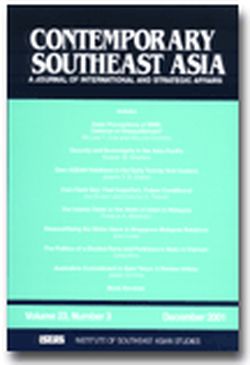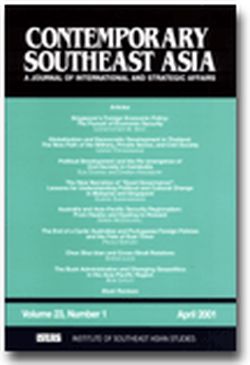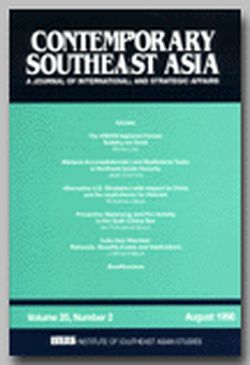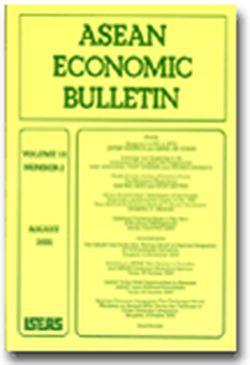Contemporary Southeast Asia: A Journal of International and Strategic Affairs Vol. 23/2 (Aug 2001)
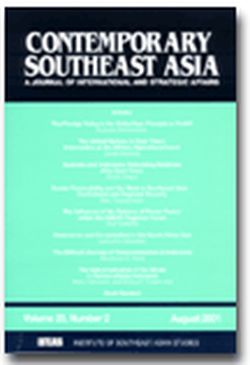
Date of publication:
August 2001
Number of pages:
189
Code:
CS23/2
About the publication
An internationally refereed journal that specializes in the politics, international relations and security-related issues of Southeast Asia and the Asia-Pacific.
Contents
-
Preliminary pages
- ARTICLES
-
Thai Foreign Policy in the Global Age: Principle or Profit?, by Kusuma Snitwongse, author see abstractGlobalization has brought a number of challenges to Thailands foreign policy. It is open to closer public scrutiny and the issues of democracy and human rights have also become important elements. How the country is to steer its foreign policy in order to reap benefits and avoid the downside of the new international economic reality represents a challenge. The Chuan governments policy, while it admittedly could not avoid pragmatism, nevertheless kept its sight on principles. It is yet to be seen how succeeding governments, starting with the Thaksin government, will deal with the dilemma between principle and profit within the increasing complexity of international relations in the global age.
-
The United Nations in East Timor: Intervention at the Military Operational Level, by David Dickens, author see abstractThis is a study of a humanitarian intervention in Southeast Asia led by a neighbouring state. The focus of the article is the first month of the International Force East Timor (INTERFET) operation led by Australia on behalf of the international community, with strong regional support, at the invitation of Indonesia. The article deals with the practical considerations that confronted senior military commanders as they implemented INTERFET's United Nations Security Council mandate at the operational level. INTERFET sought to shape events in East Timor through the deterrence of certain Indonesian force elements while at the same time developing effective co-operation with senior Indonesian military officers. Various aspects of the INTERFET operation are analyzed.
-
Australia and Indonesia: Rebuilding Relations After East Timor, by Peter Chalk, author see abstractAustralia's intervention in East Timor in late 1999 caused a major rupture in the country's relations with Indonesia, which are currently the worst they have been in three decades. Rebuilding a stable partnership with Jakarta remains imperative, given the Republics proximity to Australia and the key role that the archipelago plays in wider Southeast Asian multilateralism. Achieving this will not be easy, given the absence of the sentimental ballast that had come to characterize government-to-government relations for much of the 1990s. Any policies that are instituted will have to build on those diplomatic openings that do exist while moving to ensure that potential pitfalls of which there are many do not escalate to assume unwarranted significance and importance on the bilateral agenda.
-
Border Permeability and the State in Southeast Asia: Contraband and Regional Security, by Eric Tagliacozzo, author see abstractIn Southeast Asia, governments have increasingly tried to regulate international flows of commodities for financial, territorial, and security reasons. This article examines the relationship between borders and contraband in this arena, arguing that their interrelationship has become an important and under-studied part of the regional security mosaic. The article analyses some of the connecting mechanisms between ASEAN frontier regions, and then explores how these mechanisms are being undermined by a range of countervailing forces. Here, the focus is on two contraband lines in particular: the transit of wildlife, and the passage of a diverse spectrum of consumer goods. The widening transit of such commodities presents special challenges to regional security, which are likely to plague local regimes in the foreseeable future.
-
The Influence of the Balance of Power Factor within the ASEAN Regional Forum, by Ralf Emmers, author see abstractWhile the ASEAN Regional Forum (ARF) may be seen as an ASEAN attempt to expand to the wider region its approach to co-operative security, its establishment also involved power-balancing considerations. The Forum was created with the denial of hegemony in mind but not in a conventional sense. Indeed, the constraining of power was expected to be dependent on political rather than military means. The ARF was conceived as an instrument for ensuring a continued American involvement in the region and to encourage China in the practice of good international behaviour. Beyond the founding moments of the ARF, the role of the balance of power factor has carried over to the working of the institution. Significantly, China has perceived the Forum as a vehicle for promoting multipolarity in the Asia-Pacific to counter Americas unipolar status in the post-Cold War world.
-
Deterrence and Co-operation in the South China Sea, by Liselotte Odgaard, author see abstractThis article explores the impact of the Spratly Islands dispute on security relations between China and Southeast Asia after the Cold War. It is argued that the dispute reflects and promotes the emergence of a regional order combining deterrence with consultation and limited co-operation. The balance of power between China, Southeast Asia, and the United States promotes the emergence of a structure of deterrence. Within this structure, the approaches of China and Southeast Asia to diplomacy and international law allow for the development of a regional dialogue and a code of conduct based on consultation and co-operation on non-controversial issues. Consequently, the seeds of an order are emerging in the South China Sea that combines the extremes of deterrence and co-operation.
-
The Difficult Journey of Democratization in Indonesia, by Abubakar Eby Hara, author see abstractBased on the current literature on democratization, democracy in Indonesia is not yet consolidated. The masses and elites need to learn to adjust their political practices and institutions to modern liberal political behaviour. This article argues that democratization may be more fruitful if seen from an Indonesian context. In Indonesia's political history, Western ideas of liberalization and freedom, and local political ideas, such as the New Orders Pancasila democracy, religious and traditional attitudes, and mass movements, inspire many of the political practices in post-Soeharto politics. It is through exchanges of those ideas, political practices, and institutional experiences that new social agreements on the future form of democracy in Indonesia will emerge.
-
The "Industrialization" of the Media in Democratizing Indonesia, by Ariel Heryanto, Stanley Yoseph Adi, authors see abstractThis article examines the transition of Indonesia's print media: from operating under a strong, paternalistic, and authoritarian state (roughly until the mid-1990s) to the current situation characterized by liberalization, a highly competitive market, and a significantly subdued state apparatus. The transition has been complicated by two separate factors: the protracted frictions at all levels of the state apparatus and society, and the spread of the Internet. The historical change is attributable to Indonesia's process of industrialization under the New Order government (196698). The article focuses on the widespread tension between the increasingly professionalized but poorly organized journalists, on the one hand, and the management of the profit-driven media companies, on the other.
- BOOK REVIEWS
-
BOOK REVIEW: The Mekong: Turbulent Past, Uncertain Future. By Milton Osborne. Brisbane: Allen & Unwin, 2000. 295pp., by Takeko Iinuma, author
-
BOOK REVIEW: Political Transition in Cambodia, 199199: Power, Elitism and Democracy. By David W. Roberts. Richmond, Surrey: Curzon Press, 2001. 259pp., by Caroline Hughes, author
-
BOOK REVIEW: Civil Islam: Muslims and Democratization in Indonesia. By Robert W. Hefner. Princeton, New Jersey: Princeton University Press, 2000. 286pp., by Greg Fealy, author
-
BOOK REVIEW: The Asian Energy Factor: Myths and Dilemmas of Energy, Security, and the Pacific Future. By Robert A. Manning. New York: Palgrave, 2000. 246pp., by Tin Maung Maung Than, author
-
BOOK REVIEW: Democracy and International Relations: Critical Theories/Problematic Practices. Edited by Hazel Smith. London and New York: Macmillan Press Ltd and St. Martins Press, 2000. 278pp., by James M McCormick, author
-
BOOK REVIEW: Asias Emerging Regional Order: Reconciling Traditional and Human Security. Edited by William T. Tow, Ramesh Thakur and In-Taek Hyun. Tokyo: United Nations University Press, 2000. 342pp. In-Taek Hyun. Tokyo: United Nations University Press, 2000. 342pp., by Christopher W Hughes, author

